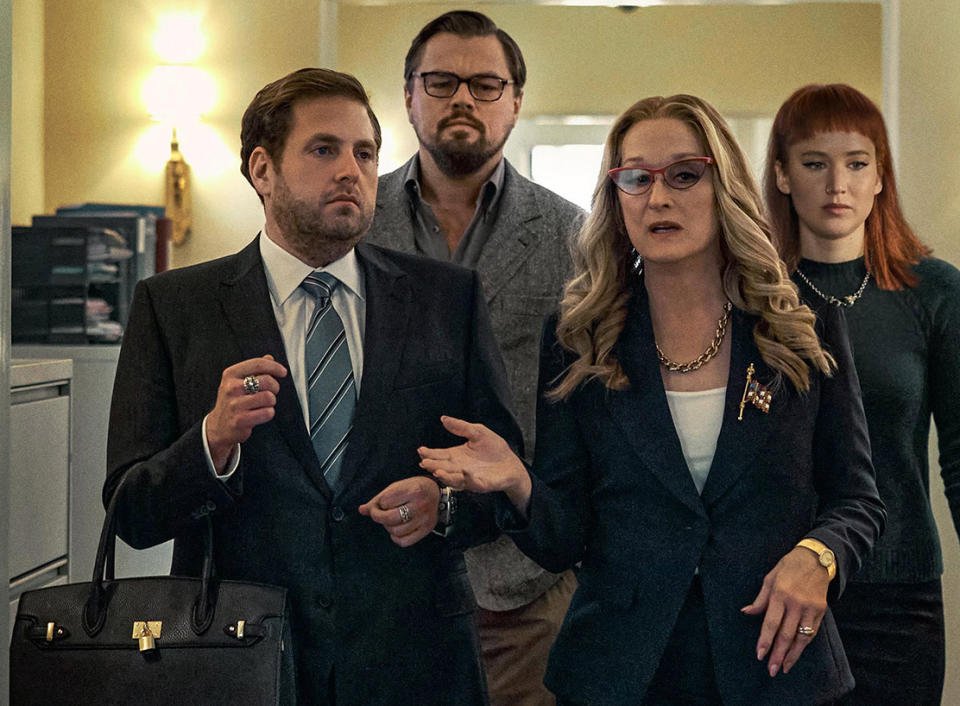How Composer Nicholas Britell Brought Jazz to ‘Don’t Look Up’ with an Unexpected Experimental Vibe

After scoring “The Big Short,” “Vice,” and “Succession” with director Adam McKay, Nicholas Britell was unprepared for the wild ride he encountered on Netflix’s climate change satire, “Don’t Look Up.” But that was actually a good thing creatively for the two-time Oscar nominee (“Moonlight,” “If Beale Street Could Talk”) and Emmy winner (“Succession). That’s because the classically trained, versatile composer always strives to break out of his comfort zone by experimenting with new musical ideas. It’s the same with McKay, who thrives on comedic improv and subversive experimentation to make unexpected emotional connections in his filmmaking. Which is why the director and composer work so well together.
“I think the thing for me and Adam is that each project is a tonal experiment. And this was definitely the most challenging,” Britell said about his Oscar contender. “It had to be a mixture of tones, incredibly comedic and at the same time it had to be about the existential crisis of the planet. How do you marry all these elements together and make it feel like a cohesive whole? Also, discovering what those different elements are at certain times?”
More from IndieWire
'Nightmare Alley': Turning Guillermo del Toro's 'Spook Show' Into a Fun House of Entrapment
This Year's Sundance Crop Yields More Non-Fiction Oscar Contenders Than Fiction
After weeding through early drafts of the script — in which two low-level astronomers played by Leonardo DiCaprio and Jennifer Lawrence can’t convince D.C. to take action about a comet heading to destroy the planet — Britell was asked to write a piece of music that McKay could play on set for the actors. “He was specifically thinking of the telescope scene in the beginning of the film [where they discover the comet],” added Britell. “The place where I started was if you could imagine almost an idealized sense of reverence for science. What are the highest principles and aspirations of humanity?”

Netflix
And Britell then wrote a demo titled “Overture to Logic and Knowledge” as an ode to those principles, which McKay played on set. “What is the sound when we adhere to this principle and then what is the opposite sound when we don’t?,” Britell continued. “So I started from that perspective. And then when we were in the edit [with editor Hank Corwin], there were a lot of experiments that I did to try and figure out those other topics: How do you get to this sense of absurdity and what the characters are feeling, which is this ever-increasing astonishment at how crazy things really are?”
The musical back and forth then led to Britell posing the question, “What if we had lost World War II?” McKay liked that and they began discussing mid-century big band jazz and making the sound bombastic and absurd. “So I was like, ‘What if there’s a banjo and toy piano and bass saxophone and dueling trumpets?’ I put it together and put it up against a draft of the main title sequence [which became the basis of the main theme]. And that was a big moment for us, because I was in the edit room with Adam and Hank and they listened.”
Hearing that big band sound even compelled the director to think more about the edit and the breakneck speed of astonishment and chaos that underscored the overall rhythm of the movie. “Adam kept using the word ‘anxiety,'” Britell said. “How do I accentuate that and then marry that with all of these other elements, creating anxiety throughout the score?”

NIKO TAVERNISE/NETFLIX
Britell’s search led to the widest range of instrumentation he’s ever used in a movie: full string orchestra, brass, woodwinds, flutes, harps, celestas, pianos, toy piano, half a dozen saxophones (including bass sax), farfisa organ, and large bass synthesizers.
One piece of music became the key to cracking the musical code: “The Call,” which is played when DiCaprio and Lawrence are on the phone with NASA. This delicate piece contains many of these odd instruments in a clash of musical sounds and vocals that escalates in intensity. “It’s the moment where we go from the world that we think we live in to the world that we actually live in,” Britell added. “A comet is coming and we will follow the science. But politics intervenes. We had to turn up the dial from the ‘OMG a comet’s coming!’ to what was going to happen next.”
At first, this rollicking, jazzy element conveyed a sense of absurdity. But after working on the piece for months, McKay kept insisting on more anxiety. Then an absurd climate change reality intervened when Hurricane Ida hit New York City, causing the roof to cave in on Britell’s house. “The water was pouring down and I told Adam, ‘Trust me: I feel anxious.’ I literally screamed into the microphone over the piece. I pitched my voice up an octave and ran it through some tape filters, woven into the track. I’m humming the main theme, but I’m also screaming multiples of me on top of itself. That is harmony and cacophony, almost like a losing-your-mind kind of feeling.”

NIKO TAVERNISE/NETFLIX
By contrast, the theme surrounding Rylance’s child-like tech billionaire Isherwell and his BASH organization had an electronic vibe highlighted by the celestas, toy piano, farfisa organ, and strange synth sounds. This reflected both science and power because of the way BASH has infected the world with its tech toys.
“Adam is always open to trying different musical ideas,” Britell said. “When I showed him a small ensemble big band piece that’s more somber toward the end, he didn’t think it would work and was surprised when it did. Hank likes to say that we play jazz together. I think we really did play jazz on this where we were very much improvising as we went. Because it wasn’t the kind of score where you came up with an idea and filled in the pieces. It didn’t flow naturally. We were searching for the right wavelength before finding the right sound for unlocking this.”
Best of IndieWire
2021 Emmys Winners List: 'Ted Lasso,' 'The Crown,' and 'The Queen's Gambit' Lead the Night
2021 Emmy Predictions: Who Will Win at the Primetime Emmy Awards?
Sign up for Indiewire's Newsletter. For the latest news, follow us on Facebook, Twitter, and Instagram.


